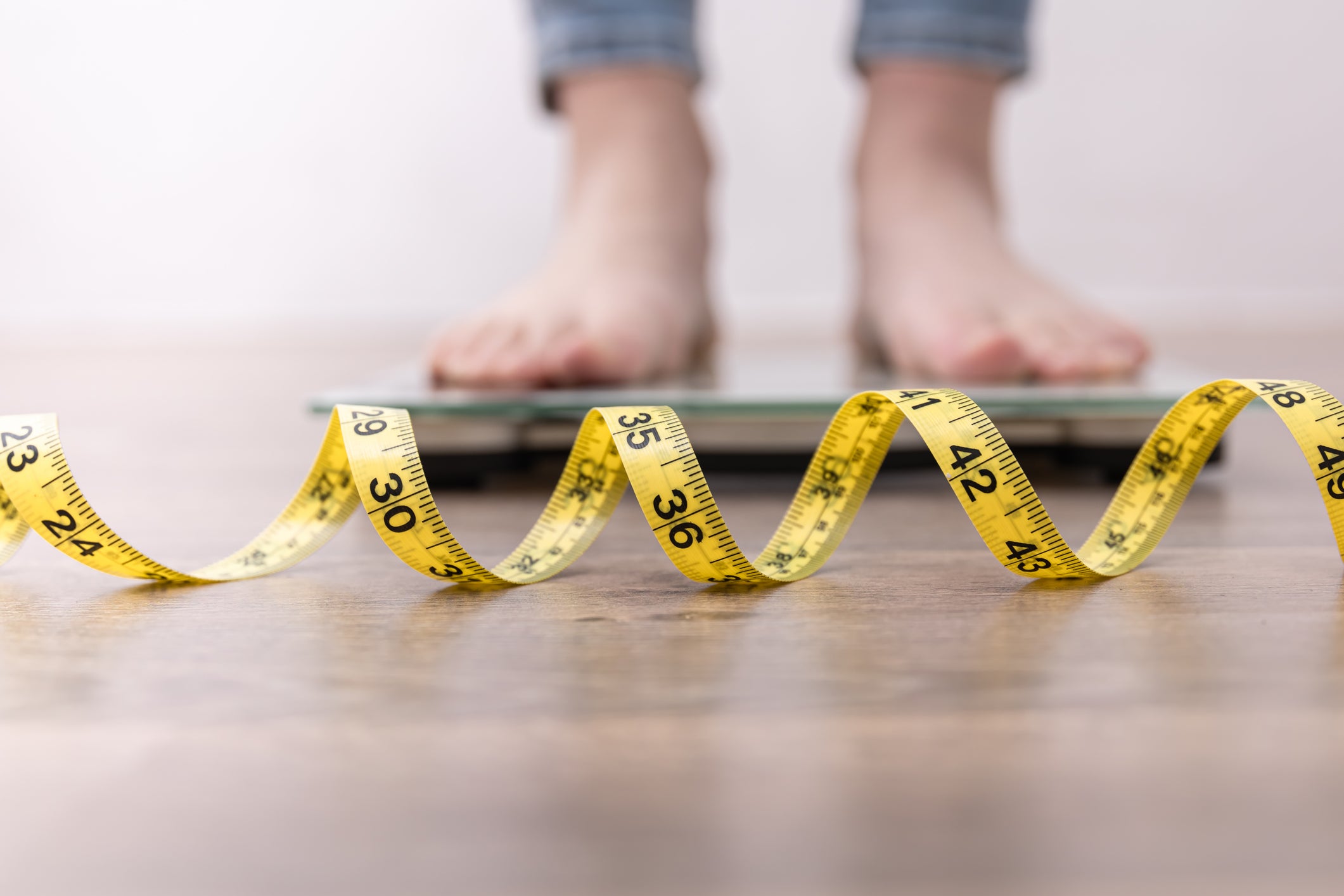The Independent's journalism is supported by our readers. When you purchase through links on our site, we may earn commission.
A personal trainer set out to learn everything he could about fat loss – this was his most important finding
The majority of diets fail long-term, fitness trainer and author Ben Carpenter tells Harry Bullmore. Instead, he proposes an alternative approach for those who want to lose weight but don’t want a restrictive eating regime

The internet is awash with health and fitness information: some of it helpful, some of it not so helpful, and some of it downright dangerous. Ben Carpenter is one of those fighting the good fight against fitness misinformation. Like Gotham’s infamous bat signal, social media users now tag him in any post making eye-raising health claims, and Carpenter comes running to confirm or debunk it with an armoury of scientific literature, experience and empathy.
This all started when he became a personal trainer in 2006, and quickly found that fat loss was a common goal across his client base. “Because of this, it became the thing I cared about the most,” he says. “If somebody asked me a question about fat loss and I didn’t know the answer, I’d go away and research it then try to come back with a really good reply. It’s supply and demand really, and there’s a lot of demand for fat loss advice.”
Carpenter then began sharing informative videos on the topic online, and things soon spiralled – he now has more than 786,000 TikTok followers. Then in 2023, he wrote his book Everything Fat Loss: The Definitive No Bullsh*t Guide, aiming to distil decades of learning into a few hundred pages. And his top takeaway may surprise you.
“If I had to pick one to really drum home to people, it is that the majority of diets fail long-term,” Carpenter tells me. “Diets don’t work for the thing that most people want them to work for.”
And what is that exactly? In Carpenter’s eyes, what people really want from a diet is to improve their health and manage their weight for the rest of their life.
“The majority of people who go on a diet will stop following that diet within six to nine months – that’s very well backed up by research,” he says. “The majority of people who lose weight will regain a lot of that weight over the course of the first few months or years [after they stop following the diet].
“People are embarking on temporary behaviours and hoping they will address long-term problems. But ultimately, if you’re following a diet to improve your health or regulate your body weight, it doesn’t make sense to only do it for two months before you get bored.”
This behaviour leads to the phenomenon known as yo-yo dieting. People go on a diet, lose weight, come off it, regain weight, then restart the cycle. They may also ditch their diet because it’s hard or unpleasant, but the common thread is that this behaviour is temporary.
Read more: This is how much protein you need each day, according to a nutritionist

The solution
To counter yo-yo dieting, Carpenter recommends adopting sustainable health-promoting behaviours you can maintain. “If you want to improve your health and manage your weight, it makes sense to pick things that you can do for the rest of your life,” he says.
For his second book, Fat Loss Habits, Carpenter once again buried himself in research before resurfacing with 13 science-backed habits for losing weight. Then, rather than using them to craft a strict diet plan for readers to stick to, he presented them as guidelines which his audience could experiment with. This way, people could find habits that chimed with their lifestyle, then weave them into move the fat loss needle in the desired direction.
The habits are:
- Prioritise nutritious lower energy-density foods
- Eat more fruits and vegetables
- Be mindful of extra dietary fat
- Prioritise lower-calorie drinks
- Exercise more, at least to a point
- Increase lifestyle activity
- Exercise snacks
- Ensure adequate sleep quality
- Consume adequate protein
- Eat without distraction
- Slow down when you eat
- Engineer your immediate food environment
- Keep a regular eating pattern
Read more: I don’t exercise to lose weight – but if I did, who cares?

How do these habits work?
A calorie deficit (or negative energy balance) is the fundamental principle behind weight loss, and simply means you are expending more calories than you are consuming.
“Rather than thinking, ‘I need to do intermittent fasting or time-restricted feeding or keto because someone’s selling it’, understanding that all diets work on the principle of creating a negative energy balance is really important, because then it allows people to follow a diet plan that is more suitable for them,” says Carpenter.
“If someone goes from zero to 100 straight away, which is what diets are often like, within four weeks they’ll realise they can’t keep up with that pace and stop. I want people to prioritise consistency over perfection, so I’m trying to find ways to help them go from zero to 10, then 10 to 20. That’s often a gradual process.”
Each of Carpenter’s selected habits can help you achieve a calorie deficit. Exercising more will obviously increase your overall energy expenditure, but some of them work in more surprising ways.
“A lot of diets focus on restriction and avoidance: you’re not allowed to eat certain things, or you have to reduce your intake of xyz,” he says. “I like focussing on nutritious foods you can add in. They tend to have a habit of displacing other [more energy-dense] foods out of your diet because appetite is finite.”
He identifies nutritious foods as those which tend to be “slightly less processed”, such as fruit, vegetables, lean proteins, beans, lentils and wholegrains.
As far as lifestyle factors are concerned, Carpenter says the vast majority of people will burn far more energy via general lifestyle activity than they will while exercising. So, the effects of making small but consistent changes such as swapping escalators for stairs where possible and picking a parking spot slightly further away from the supermarket can add up significantly over time.
Sleep is another key area to focus on, with studies showing that “just a single night of sleep deprivation can skew appetite hormones to the point that people will eat more the next day”.
“The way it improves your diet is a downstream effect of a health-promoting habit, rather than consciously thinking ‘I am trying to eat less food’,” says Carpenter.

Markers of success
Encouraging general health-promoting behaviours is a central pillar of Carpenter’s work. If he is going to help people lose weight, he is determined to do it the right way.
“A fundamental point for people to understand is that changing your body weight and improving your health are not the same thing,” he explains. “The reason I make a big point about that is because a lot of people lose weight to improve their health, but then they embark on behaviours that are not health-promoting.”
This might mean restricting their food to unhealthy levels, or embarking on a nutrient-poor diet, all in the name of cutting calories.
Carpenter also wants to change how the success of a diet is measured; something historically gauged by the number on a scale or the way you look in a mirror.
“If someone’s only motivation is weight loss, it can often deter them when that stops,” he says. “If one of the things they are doing is eating more fruits and vegetables, then their weight loss plateaus and they go back to doing what they were doing before, they have severed their relationship with eating more fruits and vegetables because their motivation was the number on the scale. They have decreased their diet quality.
“Research has also shown that people who hit a weight loss plateau often stop exercising. That is a huge problem because exercise is independently health-promoting; it isn’t only beneficial if you lose weight.”
Instead, Carpenter urges people to adopt and maintain health-promoting behaviours, then measure the success of their diet and lifestyle on a wider range of parameters.
“Deeper motivations could be improvements in performance, stress, energy levels or quality of life,” he says. “If someone is able to find a reward independent of their body weight that excites them enough to keep going, I think that’s a really key thing.”
Read more: The three short weekly workouts that can transform your fitness

The importance of compassion
Food is a loaded topic for many, and while it’s practical to reduce weight loss to a simple calories in versus calories out equation, it’s also important to consider the wider genetic, contextual and emotional factors at play.
“I think the compassion side is really neglected,” says Carpenter. “I did an event in London recently and one of the questions was: ‘How do you balance talking about weight loss in a way that is compassionate and doesn’t make people feel terrible?’.”
A lot of dieting advice can place a “lazy” label on those unable to lose weight, he says, and this can be compounded by language used by some fitness professionals. “I wrote a Tweet a few years ago which went viral, and it said something like: ‘Fitness professionals are hardcore exercise enthusiasts who often don’t know how to empathise with people who are not also hardcore exercise enthusiasts’.
“There’s a risk with a lot of fitness professionals that they accidentally alienate a lot of people because of the way they talk to them. I’ve had clients who’ve worked with personal trainers in the past and found they don’t make them feel good.”
Carpenter likens this to the experience of people who feel intimidated by a gym environment, and consequently avoid it.
“The gym is quite an elitist environment,” he says. “For someone who is classed as overweight or obese, if you look at survey data, a primary reason for [them not going] is because they find the atmosphere and a lot of fitness professionals intimidating; there are a lot of buff dudes and lean women who are very strong.”
This is a large part of the reason Carpenter took his advice online, and later made it available in book form.
“To me, if we can’t reach the people who don’t want to join a gym, who is going to reach them?” Carpenter asks.
“These are the people who fitness professionals should try to reach more, so for me it’s really important that I can give fitness advice to anyone who wants it, even if they’re petrified of going to the gym or talking to personal trainers because they’ve had bad experiences in the past.”
Read more: Five science-backed sleep tips to supercharge your fitness efforts
Join our commenting forum
Join thought-provoking conversations, follow other Independent readers and see their replies
Comments


Bookmark popover
Removed from bookmarks